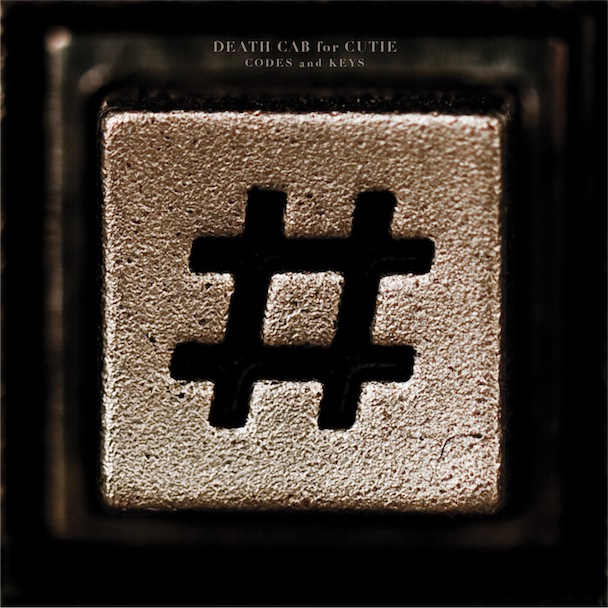Of all the pre-release press for Death Cab For Cutie’s seventh full-length album, Codes And Keys, the most intriguing came from an interview with Spin Magazine, in which songwriter Ben Gibbard confessed to dealing with alcoholism and told of a particularly eyebrow raising incident involving beers, shots, and – gasp – pizza. And while it is easy to scoff at what many twenty-somethings would consider a typical Wednesday night (as SF Weekly and Hipster Runoff did), calling to mind Bob Saget jumping up and shouting “I used to suck dick for coke,” it points to a major issue within the construction of the band Death Cab For Cutie.
See, as a singer, Ben Gibbard has never shied away from serious subject matter. Though his keen eye for detail on “What Sarah Said” and “Styrofoam Plates” dealt pointedly with loss and death, Gibbard’s paper-thin voice has often been a take-it-or-leave-it commodity at the front of an always competent backing band, overshadowing his keen ear for an ear-worm melody. When hearing him sing, the question has to be asked: do I believe him? On songs with less at stake, like the longing love songs that Death Cab absolutely nails (“Transatlanticism,” “I Will Follow You Into The Dark”), it is easier to give Gibbard the benefit of the doubt. And even on the aforementioned weightier material, numbers wound up as successes because Death Cab were a modest and sincere-seeming band. But now, on Codes And Keys, where Gibbard is seemingly as unrelatable as ever, issues of believability and trust find themselves on shaky ground, as does Death Cab For Cutie’s future as a critical darling.
Luckily, the band’s place as a commercial force is on solid footing and Codes And Keys should do nothing to harm that. From top to bottom, there is not a weak song on the record, and nearly every cut showcases not only Gibbard’s melodic gift (and it is certainly a gift), but also the production work of bandmate Chris Walla. From a pure engineering and recording standpoint, the album works both as a departure from previous material, with nearly no guitar crunches or over-the-top arrangements, but also a logical next-step for the never complacent group. “Doors Unlocked And Open” is a smooth and tense racer, driving forward in third gear like Spoon do at their best, never falling for the obvious distortion climax that the band used thrive on. “Some Boys” also applies graceful pressure, combining Gibbard’s dragonswing lyrical plays with the hint that the song is building toward a cliched payoff. When that payoff never comes, and the song is, rather, revealed to be just carefully layered harmonies and piano parts, the audience is rewarded with not only a refreshing version of Death Cab For Cutie, but also the realization that age and maturity may be suiting the band well.
But, while all the pieces for a good, if not great, album seem to be in place, the complete puzzle is frayed on the edges and lacks binding to hold it all together. The flawed element, though, isn’t hard to pinpoint and identify. It is the star of nearly every song – Ben Gibbard. Yes, it is the personality, i.e. the lyrics and voice, that sags and weighs down Death Cab, where that used to be the selling point. Often times on Codes And Keys, it seems that Gibbard is tapping a dry well and his semi-clever turns of phrase feel forced, or even trite. Instead, we get multiple lines dwelling on the architecture of a church and a song that is literally called “Stay Young Go Dancing,” whose lyrics holds about as much insight as that phrase does. Gibbard is notably less mopey on a whole, and well, it makes the songs that aren’t optimistic or lofty seem dubious. “Underneath The Sycamore,” instead of coming across as the emotionally immediate track that it tries to be, winds up as a contrived exercise in vagueness, which even the specificity of the tree can’t save.
This dichotomy of capable musicianship with lackluster lyrics ultimately makes Codes And Keys a tough sell. Sure, it is pleasant enough to listen to in the background, but too much thought or analysis finds a record that is rather shallow, which is so far from the thinking-kids’ soundtrack that the band has built a career out of. The end result is an unfortunate fact that while Death Cab For Cutie seems as capable as ever at expressing themselves, they are running out of things to say. Or, at least, things worth hearing.

